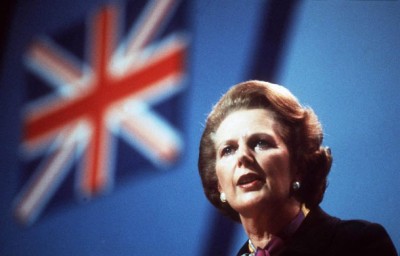Margaret Thatcher’s Role in Controversial £42 Billion Arms Deal with Saudi Arabia. Declassified Files

A set of declassified documents have revealed former prime minister Margaret Thatcher’s involvement in one of Britain’s biggest and most controversial arms deals. According to the newly released files, the former prime minister met Saudi Arabia’s King Fahd to convince him to purchase fighter jets from British Aerospace rather than France.
Thatcher reportedly made a quick trip to Riyadh on 14 April 1985 to “smoke out the Saudis” and have lunch with the ruler of the country. At the time, Britain was attempting to close the Al-Yamamah deal — a £42bn ($55.3bn) contract with the oil-rich country, to sell them 30 British Hawk and 72 Tornado fighter jets.
France was simultaneously trying to pitch its own contract for the sale of the Mirage aircraft. Prince Bandar bin Sultan Al Saud — an anglophile and the influential Saudi ambassador to Washington — told the Foreign Office that the king preferred their deal and invited Thatcher to visit Riyadh for a talk.
According to the documents released by the National Archives at Kew, the defence secretary at the time, Michael Heseltine was confident the meeting between Thatcher and the king would clinch the deal. Heseltine’s private secretary, Richard Mottram, wrote to Thatcher’s adviser Charles Powell stating: “It seems unlikely that Prince Bandar would seek to engineer such a meeting unless something positive was likely to come out of it, otherwise he runs the obvious risk of embarrassing both the Prime Minister and King Fahd.”
Following the meeting — the government decided to keep the reason for the meeting a secret — Thatcher wrote the king a letter thanking him for being “able to discuss a further matter privately”.
In a later correspondence with Sir Patrick Wright, the UK’s then ambassador to Riyadh, she wrote: “I was able to have a private word with him [the King] over lunch on the particular matter about which you know.”
By September 1985, the deal was signed and created thousands of jobs through defence giant BAE Systems and its partners. However, it was also steeped in controversy following allegations that a slush fund worth millions of pounds was paid to members of the Saudi royal family. In 2006, Tony Blair’s government stopped a corruption investigation by the Serious Fraud Office into the fund stating it would result in “serious damage” to relations between the UK and Saudi Arabia.
Finally in 2010, BAE Systems reached a £286m settlement over corruption claims with the Serious Fraud Office and the US Department of Justice.

